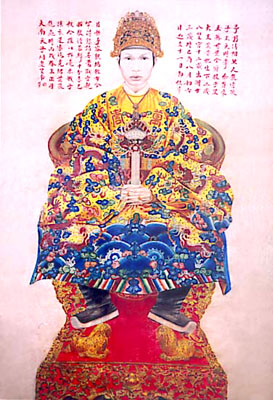
He first came to prominence at the Holy Citadel in the imperial capital city of Hue as Nguyen Canh Tong at the age of 19, when he was adopted by his uncle, the long reigning but childless Emperor Tu Duc. Of the three nephews adopted by Tu Duc, Canh Tong was the second oldest, younger than the 31-year-old Nguyen Duc Duc, but older than Nguyen Gian Tong, who was only fourteen. According to the Vietnamese author Pham Van Son, it was Nguyen Gian Tong who was chosen to succeed Tu Duc, but nevertheless, four emperors would rise and fall after Tu Duc before Canh Tong came to the Golden Throne.
He came one step away from power with the accession of his younger brother Ham Nghi, who was chosen mostly for his youth and supposed lack of educa-
The capital was in turmoil by these events, even moreso when Ton That Thuyet issued the "Save the King" appeal in the name of Emperor Ham Nghi. The French asserted that the throne had been abandoned and, indeed, as Ham Nghi had been taken by force, it presented a problem for the elite mandarins at court. During this brief interregnum the dynastic council appointed Tu Duc's 75-year-old uncle, Tho Xuan Vuong, head of the council, as temporary head of state or Giam Quoc. Finally it was decided, in accordance with ancient Vietnamese law that the country cannot be one day without a king, and considering his original position as the heir of Tu Duc, that Canh Tong, Duke of Kien Giang, should become emperor. He was enthroned on September 19, 1885 and took the name of Dong Khanh for his reign.
The new Dong Khanh emperor, undeniably, ascended the throne with the odds stacked against him in the court of public opinion. Ham Nghi, symbolic head of the resistance against the French invaders, had become hugely popular and it was Dong Khanh's father-in-law, General Nguyen Than, who was aiding the French in crushing the movement. Dong Khanh also condemned Ham Nghi and his supporters as traitors. He also did not help his cause by immediately after his enthronment, going in person to thank the French resident-general, Count Roussel de Courcy for his support in putting him on the throne. To many this was a totally disgraceful act, showing that he owed his "crown" to France rather than Heaven's mandate. However, Dong Khanh's true feelings can only be guessed at. Was he really nothing more than a disgraceful French collaborator? Perhaps he sincerely felt that a policy of peace and cooperation was the only way his nation and dynasty could survive?
Certainly, the feelings of those around him were obvious. The French always had nothing but good things to say about Emperor Dong Khanh, he kept up the traditional role of emperor in every way except actual rule, which was up to the French, and he made no trouble with them, a course of action which must, in all fairness, be seen in light of the fact that, up to that time, the French had soundly defeated every challenge to their 'protectorate'. Nevertheless, nothing he did seems free of controversy. His declaration of religious toleration for Christians encouraged the guerilla fighters of the Can Vuong movement to lash out against the Catholic community and when he followed French instructions and undertook a journey through the countryside to encourage Franco-Viet cooperation he was met by a violent response from his subjects. The situation became so bad he had to abandon the trip and flee to the coast where he was returned to Hue in an armed fleet of junks. His institution of the Order of the Dragon of Annam, under joint-rule with the President of France, was seen by his people as a merit badge for colonialists and collaborators.
Nor was the homelife of Emperor Dong Khanh much more pleasant. By several wives he had eight children, half of which did not long survive. Moreover, he was also plagued with poor health. He also suffered from hallucinations which prompted the French to disallow any of his offspring to succeed him to the throne (an act they would later regret and correct). His death on January 28, 1889, after
